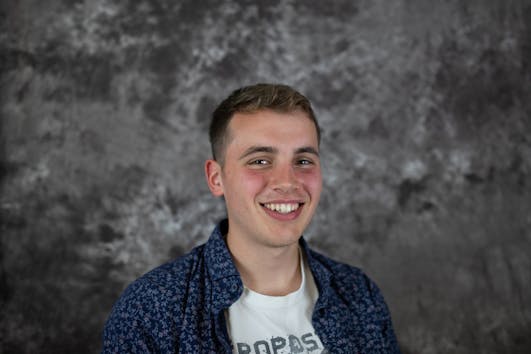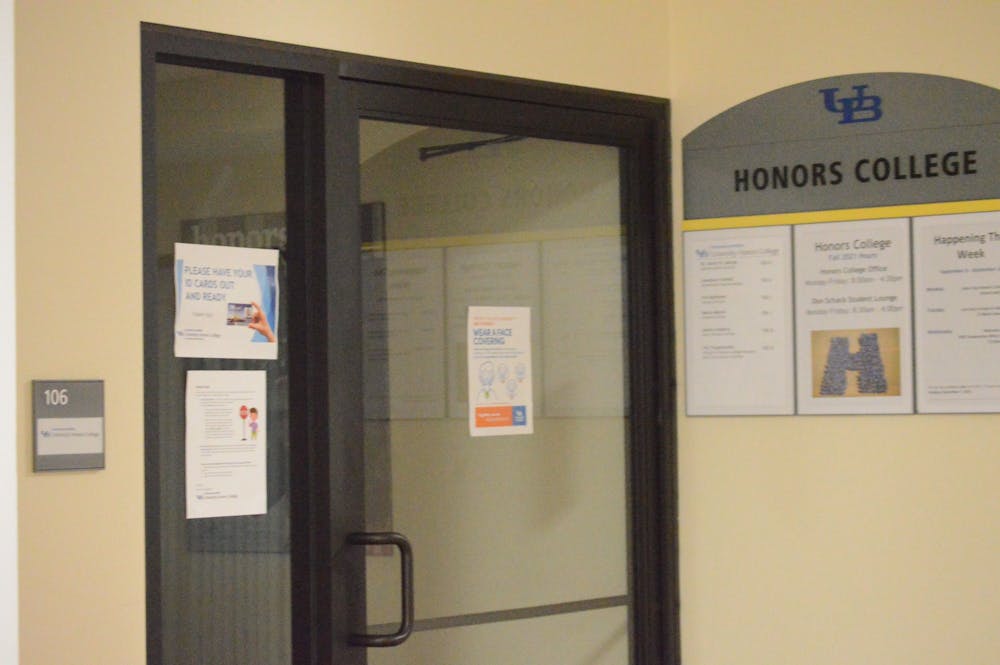After spending the fall 2020 semester entirely online in his home country of Nigeria, Namhe Itegboje was excited to begin the spring semester on campus.
The then-freshman electrical engineering major rode out his first snowstorm, attended in-person classes and made friends in the Governors Complex, where he lived with many of his fellow Honors College students. Some of those friends were Black. Others were international students, like him.
Some weren’t. He reveled in it.
“I’ve... become friends with people from five different countries [since coming to UB],” he said halfway through the spring semester, almost bragging.
Which was why, despite knowing that UB was more ethnically diverse than its Honors College, Itegboje was so shocked to learn that he shared an Honors College cohort of 405 students with only nine domestic Black students.
“I would’ve expected much more,” Itegboje said. “That means I know, …like, half the Black people in [my] Honors College [class]!”
The university’s Honors College is whiter but more female than the university’s general population, according to university admissions and enrollment data reviewed by The Spectrum this month.
Female students made up 52.7% of Honors enrollees last fall, compared to just 44.2% among non-Honors students. Females were a minority in the incoming Honors classes of 2018 and 2019, but each of those cohorts was still more female than the university at large.
However, about 58% of Honors students who enrolled in the fall of 2020, the most recent class for which complete enrollment data were available, were white, compared to just 48.5% of non-Honors College freshmen that semester.
Some of that may be changing, though. Successive freshman classes of Honors students have been more diverse. Honors College freshmen were 65% white in the fall of 2018, considerably whiter than Honors freshmen in the fall of 2020. The share of incoming Honors students representing underrepresented minorities — defined by the University Factbook as “includ[ing] Black, Hispanic, and Hawaiian ethnicities” — has increased slightly during the same time period, rising from 6.7% in 2018 to 9.25% in 2020.
That trend appears to have continued into fall 2021, when “the Honors College enrolled the most URM [underrepresented minority] students in its freshman class in its 40-year history” despite incomplete enrollment data, according to Dawn Reed, director of Interdivisional Marketing & Communications for the university’s Enrollment Management office.
The percentage of URM students in the Honors College still lags behind that of the rest of the school, however. Students from underrepresented minority groups made up 21% of the non-Honors, incoming freshmen in 2020.
According to Reed, the Honors College has implemented some programs to make incoming freshmen from underrepresented communities more comfortable, such as pairing them with mentors of color in programs like the Schomburg Fellows Program, hosting a Welcome Weekend event for freshmen to mingle with upperclassmen, and holding the Generation Honors Program, which teaches incoming freshmen about on-campus resources while “fostering a sense of community and connection.”
“Our goal to diversify the Honors College extends beyond race and ethnicity to also include a diverse balance of gender, students from various geographic areas, students from varying socio-economic backgrounds and across all disciplines,” Reed said in an email. “By diversifying our student body in all areas, we provide the opportunity for our students to learn from those who may be different yet who are all committed to intellectual discovery.”
Some Honors students of color, though, still felt alienated by the comparative lack of diversity.
Claire Feng, an Asian-American senior industrial engineering major, says she can recall times from her first year in the Honors College when she felt “very uncomfortable” pushing back against arguments made by her white peers in class.
“During a freshman [Honors] seminar, we were talking about the book ‘White Fragility,’ ...and one of the main points in the book is that sometimes white people spend more of their energy proving that they’re not racist than in actually helping POC communities,” Feng said, recalling one instance. “And the class discussion quickly turned into, ‘I’m not like that, my friends aren’t like that, not all white people are like that,’ and we never got to actually discuss allyship or systemic issues. I wanted to voice that we were missing the point that the author was trying to make, but I was afraid of social alienation and pushback from the rest of the class.”
Other students, like Sergio Sandoval, a sophomore accounting major and Honors student who identifies as Hispanic, are more or less apathetic about how diverse the Honors College is.
While Sandoval said he “mostly see[s] white people” on campus and thinks the Honors College could be “a little bit” more diverse since it doesn’t reflect the racial demographics of New York State, he also said that Honors College diversity “doesn’t at all” affect him personally or academically.
And although he sees diversity as a tool for learning about the world, Itegboje, too, doesn’t think of diversity as a necessity.
“I believe you can get value from wherever you are,” Itegboje said. “So, even if… everyone in the Honors College was Black, or if everyone in the Honors College was white (except for me), I’d think it's still going to be pretty much the same experience for me.”
Regardless, Honors College staff are working closely with the university’s Office of Admissions to recruit more students from underrepresented minority communities in an effort to make the Honors College more diverse, according to Reed. Such measures implemented by the Admissions Office include “a holistic review of applications, events/programming for historically underrepresented minority prospective students and bilingual marketing materials and staff.”
The problem may in part be that many of the POC students who were persuaded to apply to the Honors College simply weren’t persuaded to attend UB. While almost 12.6% of those admitted to the Honors College for the fall 2020 semester were students from URM communities, freshmen from those groups only made up 9.25% of Honors College enrollment. Asian students and students of color also had higher rates of admission than rates of enrollment. Only white students had a higher enrollment rate than admission rate in 2018, 2019 and 2020.
International recruitment for the Honors College, though, has been on an upward trajectory. The freshman Honors class in 2018 had no international students; the 2020 cohort had 30, comprising 7.7% of the class and making it the largest group of international freshmen in the history of the program, according to Reed.
Itegboje, one of those 30 international Honors students, has been enjoying the cross-cultural exchange.
“I like meeting people from different cultures,” Itegboje said. “I like learning new languages, I like trying new food. ...So I would like more [international] diversity for the simple fact that I would get to meet people from more countries... [and] learn more about the world.”
The Honors College’s historic enrollment of international students comes amid four consecutive years of decline in UB’s international student population despite intensified digital recruitment campaigns since the onset of the pandemic. University officials have blamed both federal policy and COVID-19.
Admissions data were not available for international students.
But aside from increasing international enrollment, students have their own ideas for creating a more diverse Honors College.
“A lot of the systemic issues that prevent more diversity in the Honors College [take place] at the high school level, so I understand how difficult of a task it can be [to diversify],” Feng said. “The students aren’t always something we can choose, but increasing diversity within the faculty and staff” — something Feng believes could lead to better policies — “is something within our control.”
Diversity of faculty and staff is also a goal of the Honors College, according to Reed, who noted that the Honors College “continue[s] to engage faculty from various backgrounds and disciplines to offer programming that broadens students’ perspectives through engagement with issues of diversity and equity.”
Meg Negussie advocates for a holistic and compassionate, but ultimately meritocratic system during the admissions process. The sophomore computer engineering major who enrolled in the Honors her freshman year came to her beliefs while applying to the program, and after struggling with imposter syndrome.
When first applying to UB, Negussie discussed the Honors College’s supplemental essay prompt, which asks the applicant how their experiences have broadened their perspectives and what experiences they hope to have moving forward. Her father advised her to write about being a Black woman in a STEM field.
“And I remember really not wanting to do that because I didn't want this college to accept me because I met a certain requirement [or because] I survived a certain prejudice or whatever,” Negussie said. “I was so scared of people being like, 'Oh, you're only here because you're a minority.' I didn't want to be associated with that at all.”
As such, Negussie thinks that the Honors College can solicit more applicants by making “the playing field a little less scary.”
“[When] I tell people that I'm in the Honors College, they're like, 'Wow, I can't believe that. I couldn't imagine being in [the] Honors College,'” she said. “And it's really intimidating to hold yourself to that standard.”
Grant Ashley is a senior news/features editor and can be reached at grant.ashley@ubspectrum.com

Grant Ashley is the editor in chief of The Spectrum. He's also reported for NPR, WBFO, WIVB and The Buffalo News. He enjoys taking long bike rides, baking with his parents’ ingredients and recreating Bob Ross paintings in crayon. He can be found on the platform formerly known as Twitter at @Grantrashley.





